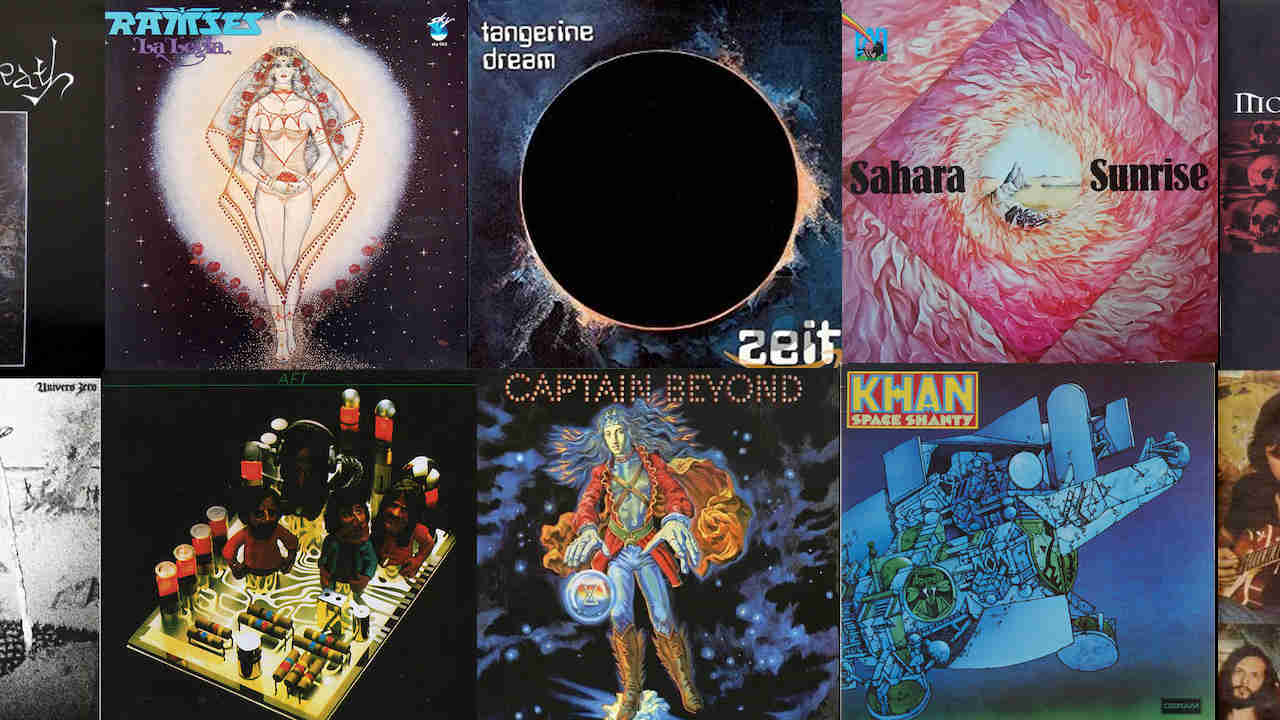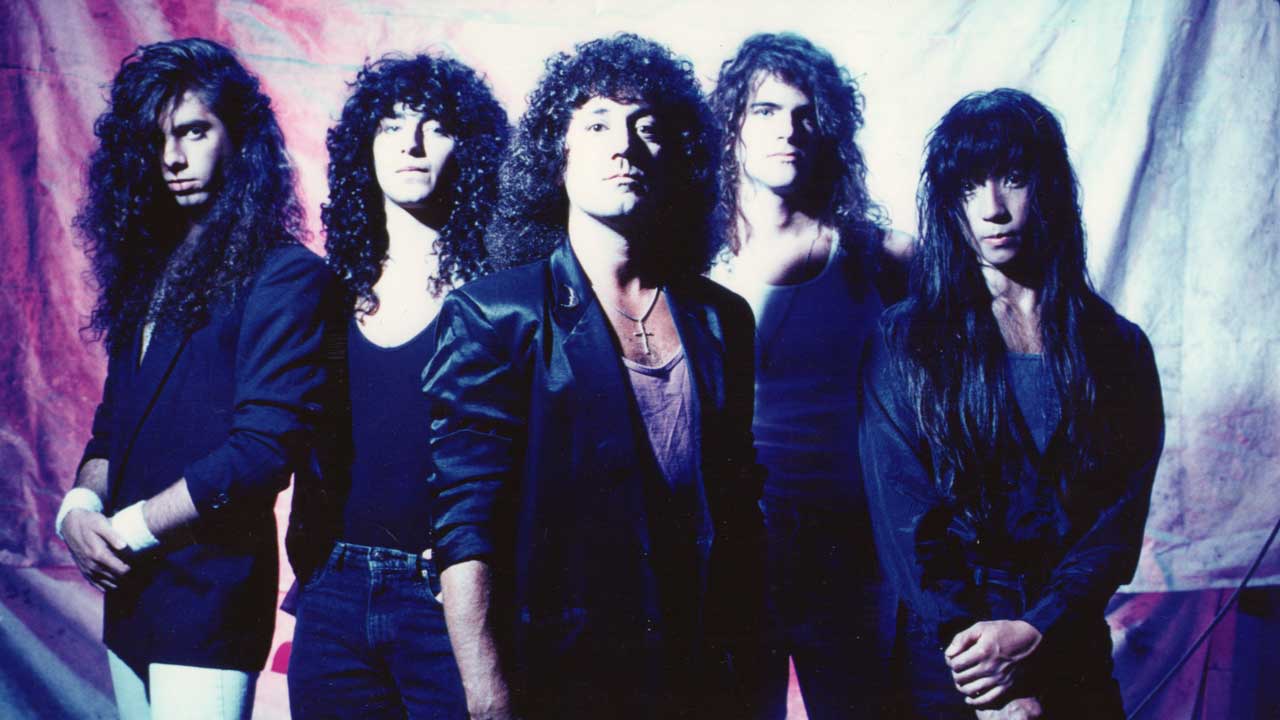10 brain-melting prog albums that are as heavy as any metal band
Brett Campbell and Joseph Rowland of post-doom trailblazers Pallbearer guide you through the heavier - and weirder – end of the prog rock underground

Pallbearer frontman Brett Campbell and bassist Joseph D Rowland don’’t just love prog, they love prog – and the further out, the better. When we asked duo to talk us through the heaviest prog albums ever made, they went deep.
“Many associate progressive rock with dudes wearing outlandish costumes playing often indulgent, technical songs about obscure fantastical subjects,” says Brett. “Sounds a lot like what a lot of people think metal is, right? There’s some grain of truth to that assessment, but, in both cases, it shows a lack of understanding of the huge variety of styles all grouped under a single label. It’s a surface view of a deep well of music. How similar to one another are, for example, Meshuggah, Neurosis, and Finntroll, really? Not very. Yet, they’re all metal bands.
“You could reasonably define both prog and metal as “unconventional music that largely operates outside the mainstream.” Well, it turns out that, despite often employing different musical approaches, metal and prog actually have quite a bit more in common than it might appear at first glance.”
So here it is: 10 of the heaviest prog albums ever to have melted the human brain, according to Pallbearer…

Shub Niggurath – Les Morts Vont Vite (1986)
Brett Campbell: Shub Niggurath took the often strange and alien style known as zeuhl, spearheaded by the great Magma, into even stranger and darker territory. Jazzy, dissonant, and unpredictable, this album captures the atmosphere of horror and encroaching madness born of witnessing a glimpse of vast, unknowable, cosmic forces beyond comprehension more effectively than many of the innumerable death metal bands who have dipped their cadaverous toes into the murky waters of R’lyeh.
Socrates Drank The Conium – Phos (1976)
Brett: This Greek band doesn’t get enough love. This album features Vangelis (of Blade Runner OST fame) on keyboards, but the real star of the show is guitarist Yannis Spathis. His mathy, winding riffs drive much of this album’s best material. Listen to the song Killer and tell me that main riff isn’t exactly that - killer.
Sign up below to get the latest from Metal Hammer, plus exclusive special offers, direct to your inbox!
Univers Zero – Heresie (1979)
Brett: A symphony of mounting dread and dissonance, Heresie is not for the faint of heart. Although Univers Zero largely uses classical instruments, the sonic territory here is for fans of the bleakest black metal, drone, and funeral doom. Genuinely unsettling, this album captures the sound of nightmares and mental breakdowns.
Morte Macabre – Symphonic Holocaust
Brett: The most recent entry on this list, Morte Macabre nonetheless sounds as if it was dug out of a dusty, forgotten bin of obscurities. The band uses classic 70s horror themes as a jumping off point to explore abstract, atmospheric jams. A variation on Fabio Frizzi’s music from The Beyond devolves into an creeping, minimalist, noisescape before the melody gradually returns like the consequences of past transgressions. A great album for autumn and fans of bands like King Crimson and Goblin.
Captain Beyond – Captain Beyond (1972)
Brett: Unlike most of this list, this one won’t clear the room at a party. Captain Beyond was formed by former members of, most notably, Deep Purple and Iron Butterfly. This album is somewhat in the bluesy, proto-metal vein of the former, but in general, has a stronger emphasis on progressive instrumental work and song structures. But it also just fucking rocks. Check out Raging River Of Fear for an absolutely ripping example of technicality in service to a great song - no wankery to be found.
Sahara – Sunrise (1974)
Joseph D. Rowland: Some of my favourite tones committed to tape in the 1970s are contained within. The fuzzed out bass is, frankly, crushing — I’m not aware of another record of this vintage with such an absolute bulldozer propelling the rhythm section. Even the triune godhead of Lake, Wetton and Squire must bow to the honestly flat-out rude level of bass-wool on display. That’s not all on offer however. It’s actually quite a dynamic journey across the album. It tiptoes through delicately cosmic passages only to charge headlong with almost berserker-like abandon at a moment’s notice. In typical prog fashion, every instrument spends time in the spotlight, but never diverges too strongly from the overall trajectory. Of note are a few particularly delightful synth-heavy and musique-concrète inspired sections that adorn the side-long final track.
Automatic Fine Tuning - A.F.T. (1976)
Joseph: When I first heard this many years ago, I legitimately believed it was a fraud. There was no way that this could have been released in 1976. It wasn’t until I held a copy of the record in my own hands that I fully believed it. Astonishingly ahead of its time, this nearly instrumental British band ran with a dual-guitar attack that somehow takes on a formula barely yet mastered by many bands whose careers hinged on such a thing, then stretches that to a wonderfully audacious limit. Even within the first minute it hits territory that reminds of the (somewhat) more recent guitar-obsessed mathlords The Fucking Champs, the earlier metal-leaning Baroness oeuvre, and more than a few Maiden-esque moments are smattered across the fittingly dual-part epic The Great Panjandrum Wheel.
Ramses – La Leyla (1976)
Joseph: Still unmatched in my estimation, and in many ways an album that singularly embodies a personal conception of a non-existent heavy genre that I wished existed. Ramses synthesizes some of the moodiest strains of Judas Priest, Uriah Heep and Deep Purple, with a dash of Canterbury Scene and fellow Germans like Jane, Eloy, and mid-period Lucifer’s Friend to craft an album that sounds like the perfect representation of proggy hard rock from far in a future that never came to pass. It’s never overly complex or showy, but displays a dour and hazy melodicism that I find to be endlessly inspiring; its spaced out synths, organs and harmonized guitar providing an ever-present dark and dreamlike backdrop that remains in place for the entire slab.
Khan - Space Shanty (1972)
Joseph: Prior to his stint in Gong (and presumably before he penned one of the best riffs in existence via Master Builder), Steve Hillage had a short-lived project that flexed much of the same muscle of his most ripping later material. While perhaps outpaced in sonic heaviness by other outre-contemporaries like Message, Gravy Train, High Tide or Mahogany Rush, this record delivers the goods for me in a way that absolutely holds its own. Filled with the flighty eccentricities that would become Hillage’s signature, hurtling through many psychedelic musical landscapes, it often lands on amazing grooves that contain an undeniable gravity, including an album outro that stands as some of the best doom metal on the books. Astonishingly he was a mere 20 years old when this album was written.
Tangerine Dream – Zeit (1972)
Joseph: There are few albums with heavier atmosphere than Zeit, which mimics its German namesake and front-cover depiction of cosmic nought in a deeply elegiac manner. Its slow-motion trudge through weightless nihil stands shoulder-to-shoulder with the esteemed old guard of funeral doom. Strings, synths, organ, and guitar bloom and decay again and again: sometimes here, sometimes frozen in an impossibly distant floe. The unfurling sequential variation can seem as measured and purposeful, or as random and entropic as the beholder is willing to admit. And perhaps the greatest thing to imagine is a notion of the era in which this was released. Tangerine Dream was not yet a household name. Synth-centric records had yet to really break from being largely relegated to kitschy retreads of baroque classics, apart from occasional “academic” explorations, so this record stands as a darkened monument all its own; a bitter but rewarding tribute to being ground into oblivion by our greatest equalizer.
Pallbearer’s new album, Forgotten Days, is released on Friday
